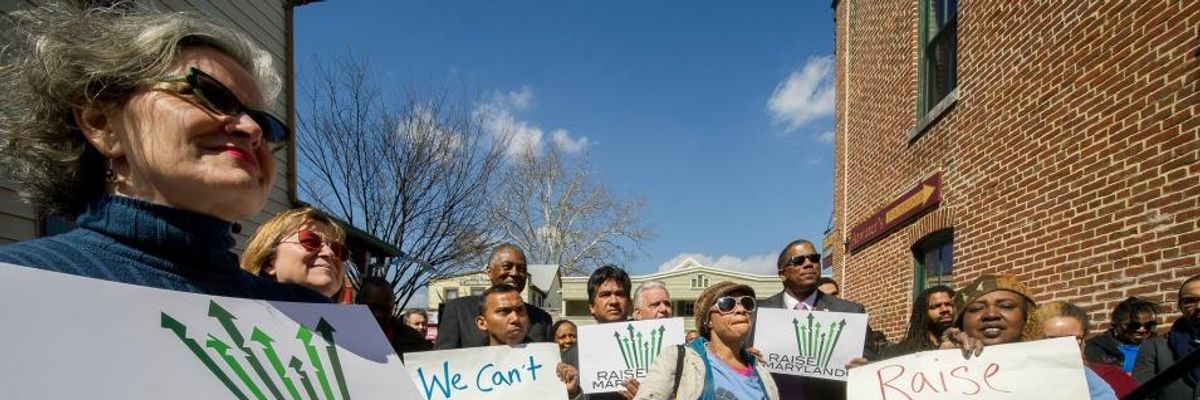
(Photo: Maryland Gov/cc/flickr)
The Minimum Wage Needs An Upgrade
Seventy-eight years ago today, the Fair Labor Standards Act made a groundbreaking promise to Americans: the promise of a fair minimum wage for an honest day's work.
That promise, however, has eroded badly over time. In recent decades, the federal benchmark has grown increasingly obsolete, guaranteeing a bare minimum that is nowhere near enough to keep up with the growing costs of rent, food, and other essentials.
Seventy-eight years ago today, the Fair Labor Standards Act made a groundbreaking promise to Americans: the promise of a fair minimum wage for an honest day's work.
That promise, however, has eroded badly over time. In recent decades, the federal benchmark has grown increasingly obsolete, guaranteeing a bare minimum that is nowhere near enough to keep up with the growing costs of rent, food, and other essentials.
As calls for higher wages grow louder nationwide, it is imperative that federal officials take action to raise the federal minimum wage and renew the promise to American workers made nearly a century ago.
If the federal rate had merely kept up with inflation since its peak in the late 1960s, it would be nearly $11, one-and-a-half times today's rate of $7.25. That rate has stayed stagnant since Congress last raised it in 2009. It is a remarkable number of years to go without an increase in wages, and workers have suffered for it.
In the absence of Congressional movement, states and cities have increasingly moved to give workers the raises they need. Yet entrenched forces at the federal level continue to stonewall, putting forth arguments that grow increasingly irrelevant by the day.
Many, for example, raise the specter of job losses. Yet cities that have raised their minimum wage in the past two years, from Los Angeles to Seattle to Chicago, simply have not seen the kinds of cataclysm that many warned about.
In fact, in Seattle, dozens of new restaurants have opened since higher wages kicked in - including many run by one of the fiercest critics of the increase. By the end of 2015, new permits for restaurants, coffee shops, and other food service establishments were on track to keep pace with or even surpass those issued in years past.
Another myth: higher wages would lead to higher prices - a bigger bill for a Big Mac, a pricier trip to Target. Yet here too, the apocalyptic predictions that precede wage increases fail to come true. In Seattle, the costs of groceries, gas, and retail have stayed stable over the past year - even though businesses warned they would need to hike prices if wages were to rise.
In recent weeks, some fast-food chains have made headlines by declaring they would replace employees with automated kiosks. Looking at the bigger picture, though, the overall risks of automation are low. Research just last year found that, while minimum wage increases can reduce some routinized jobs like cashiers, they also swell the number of more complex jobs like food preparation, resulting in an overall zero-sum change.
The fact is, raising the minimum wage gives local economies a boost by putting more money in the pockets of consumers. Higher wages also let businesses hold on to workers and improve customer satisfaction, all of which improve employers' bottom line.
That's why the majority of businesses actually support a higher minimum wage, despite the noise coming from groups like the Chamber of Commerce and the National Restaurant Association. A leaked memo earlier this year showed that 80 percent of business executives around the country support higher wages and paid sick days - and that they are coached to oppose those policies in public.
While powerful interests keep trying to muddle the debate, it's clear that even a growing economy is simply not reaching millions of hardworking Americans. And it's not just fast-food workers. A variety of workers receive less than $15: teachers, paramedics, home health-care workers, and many others. A recent study showed that even many manufacturing jobs - the foundation of the middle-class - pay less than $15, forcing the government to cover the gap with public assistance programs like food stamps and Medicaid.
As minimum wages affect more and more workers, it is no wonder that more Americans are starting to get on board. This year, dozens of cities and states - including some that lean deeply Republican - are considering increases. Colorado, Maine, Arizona and Washington State are all running ballot measures that would raise wages for close to two million workers in those states alone.
Rather than focusing on a fantasy Armageddon that never comes, lawmakers in Congress would do well to embrace the need for better pay. In the meantime, states and cities will continue the fight to fulfill the pledge that the FLSA made so many years ago.
An Urgent Message From Our Co-Founder
Dear Common Dreams reader, The U.S. is on a fast track to authoritarianism like nothing I've ever seen. Meanwhile, corporate news outlets are utterly capitulating to Trump, twisting their coverage to avoid drawing his ire while lining up to stuff cash in his pockets. That's why I believe that Common Dreams is doing the best and most consequential reporting that we've ever done. Our small but mighty team is a progressive reporting powerhouse, covering the news every day that the corporate media never will. Our mission has always been simple: To inform. To inspire. And to ignite change for the common good. Now here's the key piece that I want all our readers to understand: None of this would be possible without your financial support. That's not just some fundraising cliche. It's the absolute and literal truth. We don't accept corporate advertising and never will. We don't have a paywall because we don't think people should be blocked from critical news based on their ability to pay. Everything we do is funded by the donations of readers like you. The final deadline for our crucial Summer Campaign fundraising drive is just days away, and we’re falling short of our must-hit goal. Will you donate now to help power the nonprofit, independent reporting of Common Dreams? Thank you for being a vital member of our community. Together, we can keep independent journalism alive when it’s needed most. - Craig Brown, Co-founder |
Seventy-eight years ago today, the Fair Labor Standards Act made a groundbreaking promise to Americans: the promise of a fair minimum wage for an honest day's work.
That promise, however, has eroded badly over time. In recent decades, the federal benchmark has grown increasingly obsolete, guaranteeing a bare minimum that is nowhere near enough to keep up with the growing costs of rent, food, and other essentials.
As calls for higher wages grow louder nationwide, it is imperative that federal officials take action to raise the federal minimum wage and renew the promise to American workers made nearly a century ago.
If the federal rate had merely kept up with inflation since its peak in the late 1960s, it would be nearly $11, one-and-a-half times today's rate of $7.25. That rate has stayed stagnant since Congress last raised it in 2009. It is a remarkable number of years to go without an increase in wages, and workers have suffered for it.
In the absence of Congressional movement, states and cities have increasingly moved to give workers the raises they need. Yet entrenched forces at the federal level continue to stonewall, putting forth arguments that grow increasingly irrelevant by the day.
Many, for example, raise the specter of job losses. Yet cities that have raised their minimum wage in the past two years, from Los Angeles to Seattle to Chicago, simply have not seen the kinds of cataclysm that many warned about.
In fact, in Seattle, dozens of new restaurants have opened since higher wages kicked in - including many run by one of the fiercest critics of the increase. By the end of 2015, new permits for restaurants, coffee shops, and other food service establishments were on track to keep pace with or even surpass those issued in years past.
Another myth: higher wages would lead to higher prices - a bigger bill for a Big Mac, a pricier trip to Target. Yet here too, the apocalyptic predictions that precede wage increases fail to come true. In Seattle, the costs of groceries, gas, and retail have stayed stable over the past year - even though businesses warned they would need to hike prices if wages were to rise.
In recent weeks, some fast-food chains have made headlines by declaring they would replace employees with automated kiosks. Looking at the bigger picture, though, the overall risks of automation are low. Research just last year found that, while minimum wage increases can reduce some routinized jobs like cashiers, they also swell the number of more complex jobs like food preparation, resulting in an overall zero-sum change.
The fact is, raising the minimum wage gives local economies a boost by putting more money in the pockets of consumers. Higher wages also let businesses hold on to workers and improve customer satisfaction, all of which improve employers' bottom line.
That's why the majority of businesses actually support a higher minimum wage, despite the noise coming from groups like the Chamber of Commerce and the National Restaurant Association. A leaked memo earlier this year showed that 80 percent of business executives around the country support higher wages and paid sick days - and that they are coached to oppose those policies in public.
While powerful interests keep trying to muddle the debate, it's clear that even a growing economy is simply not reaching millions of hardworking Americans. And it's not just fast-food workers. A variety of workers receive less than $15: teachers, paramedics, home health-care workers, and many others. A recent study showed that even many manufacturing jobs - the foundation of the middle-class - pay less than $15, forcing the government to cover the gap with public assistance programs like food stamps and Medicaid.
As minimum wages affect more and more workers, it is no wonder that more Americans are starting to get on board. This year, dozens of cities and states - including some that lean deeply Republican - are considering increases. Colorado, Maine, Arizona and Washington State are all running ballot measures that would raise wages for close to two million workers in those states alone.
Rather than focusing on a fantasy Armageddon that never comes, lawmakers in Congress would do well to embrace the need for better pay. In the meantime, states and cities will continue the fight to fulfill the pledge that the FLSA made so many years ago.
Seventy-eight years ago today, the Fair Labor Standards Act made a groundbreaking promise to Americans: the promise of a fair minimum wage for an honest day's work.
That promise, however, has eroded badly over time. In recent decades, the federal benchmark has grown increasingly obsolete, guaranteeing a bare minimum that is nowhere near enough to keep up with the growing costs of rent, food, and other essentials.
As calls for higher wages grow louder nationwide, it is imperative that federal officials take action to raise the federal minimum wage and renew the promise to American workers made nearly a century ago.
If the federal rate had merely kept up with inflation since its peak in the late 1960s, it would be nearly $11, one-and-a-half times today's rate of $7.25. That rate has stayed stagnant since Congress last raised it in 2009. It is a remarkable number of years to go without an increase in wages, and workers have suffered for it.
In the absence of Congressional movement, states and cities have increasingly moved to give workers the raises they need. Yet entrenched forces at the federal level continue to stonewall, putting forth arguments that grow increasingly irrelevant by the day.
Many, for example, raise the specter of job losses. Yet cities that have raised their minimum wage in the past two years, from Los Angeles to Seattle to Chicago, simply have not seen the kinds of cataclysm that many warned about.
In fact, in Seattle, dozens of new restaurants have opened since higher wages kicked in - including many run by one of the fiercest critics of the increase. By the end of 2015, new permits for restaurants, coffee shops, and other food service establishments were on track to keep pace with or even surpass those issued in years past.
Another myth: higher wages would lead to higher prices - a bigger bill for a Big Mac, a pricier trip to Target. Yet here too, the apocalyptic predictions that precede wage increases fail to come true. In Seattle, the costs of groceries, gas, and retail have stayed stable over the past year - even though businesses warned they would need to hike prices if wages were to rise.
In recent weeks, some fast-food chains have made headlines by declaring they would replace employees with automated kiosks. Looking at the bigger picture, though, the overall risks of automation are low. Research just last year found that, while minimum wage increases can reduce some routinized jobs like cashiers, they also swell the number of more complex jobs like food preparation, resulting in an overall zero-sum change.
The fact is, raising the minimum wage gives local economies a boost by putting more money in the pockets of consumers. Higher wages also let businesses hold on to workers and improve customer satisfaction, all of which improve employers' bottom line.
That's why the majority of businesses actually support a higher minimum wage, despite the noise coming from groups like the Chamber of Commerce and the National Restaurant Association. A leaked memo earlier this year showed that 80 percent of business executives around the country support higher wages and paid sick days - and that they are coached to oppose those policies in public.
While powerful interests keep trying to muddle the debate, it's clear that even a growing economy is simply not reaching millions of hardworking Americans. And it's not just fast-food workers. A variety of workers receive less than $15: teachers, paramedics, home health-care workers, and many others. A recent study showed that even many manufacturing jobs - the foundation of the middle-class - pay less than $15, forcing the government to cover the gap with public assistance programs like food stamps and Medicaid.
As minimum wages affect more and more workers, it is no wonder that more Americans are starting to get on board. This year, dozens of cities and states - including some that lean deeply Republican - are considering increases. Colorado, Maine, Arizona and Washington State are all running ballot measures that would raise wages for close to two million workers in those states alone.
Rather than focusing on a fantasy Armageddon that never comes, lawmakers in Congress would do well to embrace the need for better pay. In the meantime, states and cities will continue the fight to fulfill the pledge that the FLSA made so many years ago.

